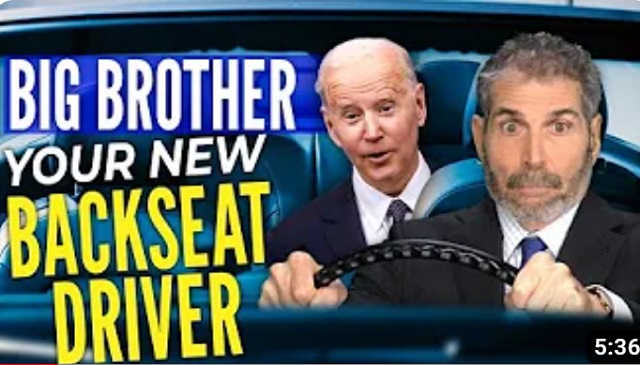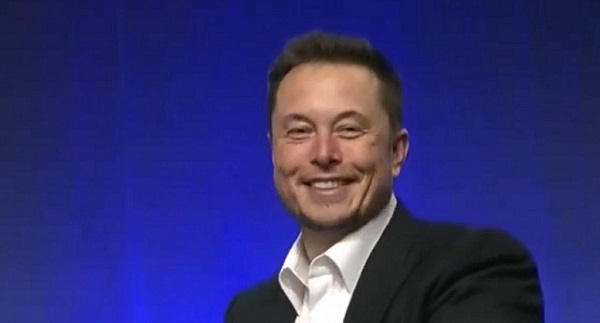Automotive
Biden’s Kill Switch: The Growing Threat of Government Control of Your Car

From StosselTV
The government may soon be able to shut down your car. Biden’s $1.2 trillion infrastructure bill includes a kill switch for new cars.
In an effort to reduce drunk driving, government wants devices in cars that will monitor and limit impaired driving. But there’s a big problem: these devices give government control over your car.
Automotive engineer and former vintage race car driver Lauren Fix points out the dangers in my video.
After 40+ years of reporting, I now understand the importance of limited government and personal freedom.
——————————————
Libertarian journalist John Stossel created Stossel TV to explain liberty and free markets to young people.
Prior to Stossel TV he hosted a show on Fox Business and co-anchored ABC’s primetime newsmagazine show, 20/20.
Stossel’s economic programs have been adapted into teaching kits by a non-profit organization, “Stossel in the Classroom.” High school teachers in American public schools now use the videos to help educate their students on economics and economic freedom. They are seen by more than 12 million students every year.
Stossel has received 19 Emmy Awards and has been honored five times for excellence in consumer reporting by the National Press Club. Other honors include the George Polk Award for Outstanding Local Reporting and the George Foster Peabody Award.
————
To get our new weekly video from Stossel TV, sign up here: https://www.johnstossel.com/#subscribe ————
Automotive
The high price of green virtue

By Jerome Gessaroli for Inside Policy
Reducing transportation emissions is a worthy goal, but policy must be guided by evidence, not ideology.
In the next few years, the average new vehicle in British Columbia could reach $80,000, not because of inflation, but largely because of provincial and federal climate policy. By forcing zero-emission-vehicle (ZEV) targets faster than the market can afford, both governments risk turning climate ambition into an affordability crisis.
EVs are part of the solution, but mandates that outpace market acceptance risk creating real-world challenges, ranging from cold-weather travel to sparse rural charging to the cost and inconvenience for drivers without home charging. As Victoria and Ottawa review their ZEV policies, the goal is to match ambition with evidence.
Introduced in 2019, BC’s mandate was meant to accelerate electrification and cut emissions from light-duty vehicles. In 2023, however, it became far more stringent, setting the most aggressive ZEV targets in North America. What began as a plan to boost ZEV adoption has now become policy orthodoxy. By 2030, automakers must ensure that 90 per cent of new light-duty vehicles sold in BC are zero-emission, regardless of what consumers want or can afford. The evidence suggests this approach is out of step with market realities.
The province isn’t alone in pursuing EV mandates, but its pace is unmatched. British Columbia, Quebec, and the federal government are the only ones in Canada with such rules. BC’s targets rise much faster than California’s, the jurisdiction that usually sets the bar on green-vehicle policy, though all have the same goal of making every new vehicle zero-emission by 2035.
According to Canadian Black Book, 2025 model EVs are about $17,800 more expensive than gas-powered vehicles. However, ever since Ottawa and BC removed EV purchase incentives, sales have fallen and have not yet recovered. Actual demand in BC sits near 16 per cent of new vehicle sales, well below the 26 per cent mandate for 2026. To close that gap, automakers may have to pay steep penalties or cut back on gas-vehicle sales to meet government goals.
The mandate also allows domestic automakers to meet their targets by purchasing credits from companies, such as Tesla, which hold surplus credits, transferring millions of dollars out of the country simply to comply with provincial rules. But even that workaround is not sustainable. As both federal and provincial mandates tighten, credit supplies will shrink and costs will rise, leaving automakers more likely to limit gas-vehicle sales.
It may be climate policy in intent, but in reality, it acts like a luxury tax on mobility. Higher new-vehicle prices are pushing consumers toward used cars, inflating second-hand prices, and keeping older, higher-emitting vehicles on the road longer. Lower-income and rural households are hit hardest, a perverse outcome for a policy meant to reduce emissions.
Infrastructure is another obstacle. Charging-station expansion and grid upgrades remain far behind what is needed to support mass electrification. Estimates suggest powering BC’s future EV fleet alone could require the electricity output of almost two additional Site C dams by 2040. In rural and northern regions, where distances are long and winters are harsh, drivers are understandably reluctant to switch. Beyond infrastructure, changing market and policy conditions now pose additional risks to Canada’s EV goals.
Major automakers have delayed or cancelled new EV models and battery-plant investments. The United States has scaled back or reversed federal and state EV targets and reoriented subsidies toward domestic manufacturing. These shifts are likely to slow EV model availability and investment across North America, pushing both British Columbia and Ottawa to reconsider how realistic their own targets are in more challenging market conditions.
Meanwhile, many Canadians are feeling the strain of record living costs. Recent polling by Abacus Data and Ipsos shows that most Canadians view rising living costs as the country’s most pressing challenge, with many saying the situation is worsening. In that climate, pressing ahead with aggressive mandates despite affordability concerns appears driven more by green ideology than by evidence. Consumers are not rejecting EVs. They are rejecting unrealistic timelines and unaffordable expectations.
Reducing transportation emissions is a worthy goal, but policy must be guided by evidence, not ideology. When targets become detached from real-world conditions, ideology replaces judgment. Pushing too hard risks backlash that can undo the very progress we are trying to achieve.
Neither British Columbia nor the federal government needs to abandon its clean-transportation objectives, but both need to adjust them. That means setting targets that match realistic adoption rates, as EVs become more affordable and capable, and allowing more flexible compliance based on emissions reductions rather than vehicle type. In simple terms, the goal should be cutting emissions, not forcing people to buy a specific type of car. These steps would align ambition with reality and ensure that environmental progress strengthens, rather than undermines, public trust.
With both Ottawa and Victoria reviewing their EV mandates, their next moves will show whether Canadian climate policy is driven by evidence or by ideology. Adjusting targets to reflect real-world affordability and adoption rates would signal pragmatism and strengthen public trust in the country’s clean-energy transition.
Jerome Gessaroli is a senior fellow at the Macdonald-Laurier Institute and leads the Sound Economic Policy Project at the BC Institute of British Columbia
Automotive
Elon Musk Poised To Become World’s First Trillionaire After Shareholder Vote


From the Daily Caller News Foundation
At Tesla’s Austin headquarters, investors backed Musk’s 12-step plan that ties his potential trillion-dollar payout to a series of aggressive financial and operational milestones, including raising the company’s valuation from roughly $1.4 trillion to $8.5 trillion and selling one million humanoid robots within a decade. Musk hailed the outcome as a turning point for Tesla’s future.
“What we’re about to embark upon is not merely a new chapter of the future of Tesla but a whole new book,” Musk said, as The New York Times reported.
Dear Readers:
As a nonprofit, we are dependent on the generosity of our readers.
Please consider making a small donation of any amount here.
Thank you!
The decision cements investor confidence in Musk’s “moonshot” management style and reinforces the belief that Tesla’s success depends heavily on its founder and his leadership.
Tesla Annual meeting starting now
https://t.co/j1KHf3k6ch— Elon Musk (@elonmusk) November 6, 2025
“Those who claim the plan is ‘too large’ ignore the scale of ambition that has historically defined Tesla’s trajectory,” the Florida State Board of Administration said in a securities filing describing why it voted for Mr. Musk’s pay plan. “A company that went from near bankruptcy to global leadership in E.V.s and clean energy under similar frameworks has earned the right to use incentive models that reward moonshot performance.”
Investors like Ark Invest CEO Cathie Wood defended Tesla’s decision, saying the plan aligns shareholder rewards with company performance.
“I do not understand why investors are voting against Elon’s pay package when they and their clients would benefit enormously if he and his incredible team meet such high goals,” Wood wrote on X.
Norway’s sovereign wealth fund, Norges Bank Investment Management — one of Tesla’s largest shareholders — broke ranks, however, and voted against the pay plan, saying that the package was excessive.
“While we appreciate the significant value created under Mr. Musk’s visionary role, we are concerned about the total size of the award, dilution, and lack of mitigation of key person risk,” the firm said.
The vote comes months after Musk wrapped up his short-lived government role under President Donald Trump. In February, Musk and his Department of Government Efficiency (DOGE) team sparked a firestorm when they announced plans to eliminate the U.S. Agency for International Development, drawing backlash from Democrats and prompting protests targeting Musk and his companies, including Tesla.
Back in May, Musk announced that his “scheduled time” leading DOGE had ended.
-

 Alberta1 day ago
Alberta1 day agoFrom Underdog to Top Broodmare
-

 Energy2 days ago
Energy2 days agoPoilievre says West Coast Pipeline MOU is no guarantee
-

 Alberta2 days ago
Alberta2 days agoWest Coast Pipeline MOU: A good first step, but project dead on arrival without Eby’s assent
-

 Alberta2 days ago
Alberta2 days agoCarney forces Alberta to pay a steep price for the West Coast Pipeline MOU
-

 Business1 day ago
Business1 day agoHigher carbon taxes in pipeline MOU are a bad deal for taxpayers
-

 Energy2 days ago
Energy2 days agoWill the New West Coast Pipeline MoU Lead to Results? Almost Certainly Not According to AI
-

 Business1 day ago
Business1 day agoMan overboard as HMCS Carney lists to the right
-

 Alberta1 day ago
Alberta1 day agoREAD IT HERE – Canada-Alberta Memorandum of Understanding – From the Prime Minister’s Office









